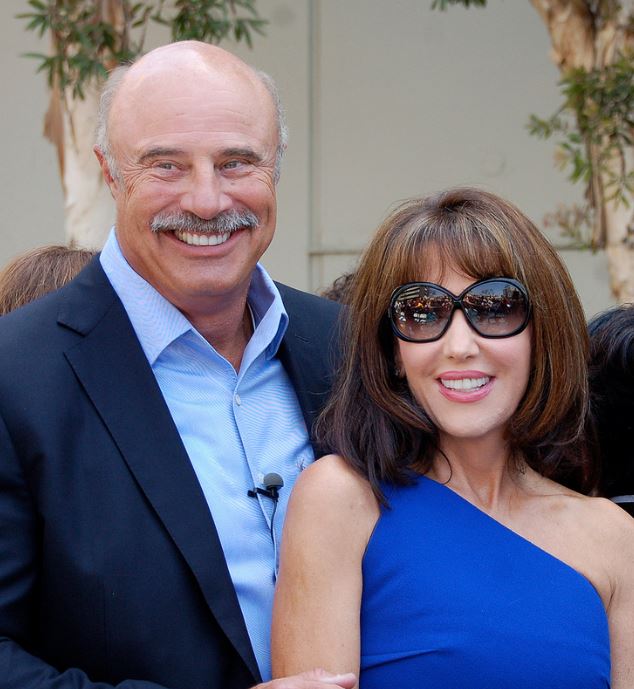Dr. Phil McGraw has spent decades telling guests to “get real.” But now, the man who made his fortune diagnosing America’s messy lives on daytime TV finds himself in the hot seat of his own drama—one involving bankruptcy filings, televangelists, and a jaw-dropping $500 million lawsuit.
Yes, you read that right. Half. A. Billion. Dollars.
For most, that’s Monopoly money. For Dr. Phil, who built a daytime empire off his no-nonsense brand of pop psychology, it’s now his very real problem—courtesy of the Trinity Broadcasting Network (TBN), a powerhouse in religious broadcasting, which has launched a countersuit that makes any on-air squabble from Dr. Phil look like child’s play.
From Talk Show Throne to Bankruptcy Court
Just weeks ago, headlines screamed that Dr. Phil filed for bankruptcy protection. It shocked longtime viewers who still remembered him sitting on Oprah Winfrey’s stage in the late ’90s, doling out blunt relationship advice before landing his own show in 2002.
For two decades, Dr. Phil was a cultural juggernaut. It aired in more than 100 countries, raked in Emmy nominations, and spun McGraw into a household name. He parlayed that success into production companies, podcasts, book deals, and even forays into streaming ventures.
But daytime television doesn’t last forever. Ratings slid, controversies piled up—including allegations about guest treatment and “toxic workplace” whispers—and by 2023, Dr. Phil wrapped after 21 seasons. The king of advice seemed untouchable… until he wasn’t.
When his media empire filed bankruptcy in mid-2025, industry insiders shrugged: maybe Dr. Phil, like many celebs before him, was restructuring debt, not going broke. But then came the curveball—TBN’s countersuit.

Why TBN Wants $500 Million From Dr. Phil
At the heart of the drama: a deal gone sour. Dr. Phil’s media ventures reportedly partnered with TBN on content distribution and financing projects. But according to the network, McGraw’s side breached agreements, leaving them financially and reputationally exposed.
And that word—“reputational”—is key.
TBN claims that Dr. Phil’s business decisions not only cost them money but also damaged their standing in the industry. To televangelists who rely on credibility (and donor trust), that’s no small accusation. The countersuit balloons to a staggering $500 million, a number that raises eyebrows even among seasoned legal analysts.
https://www.youtube.com/watch?v=B0MRiu8GVfQ
Legal Experts Chime In
So what’s really going on? We asked legal experts to weigh in (because in a case like this, “get real” might need to come with a footnote).
According to one entertainment attorney, lawsuits like this are as much about leverage as they are about damages. “A $500 million claim is headline-grabbing—it creates pressure,” the lawyer explained. “But realistically, most such cases settle. The real fight here isn’t just money—it’s about reputational control.”
Which makes sense. Dr. Phil’s entire brand was built on credibility, authority, and trust. Once that slips, it doesn’t matter how many books he sells or podcasts he records—the brand crumbles.
The Reputation Economy
If you think about it, McGraw’s biggest asset isn’t his bank account—it’s his reputation. He’s not an actor who can pivot to a different role or a singer who can reinvent their sound. Dr. Phil is Dr. Phil. Without the trust of viewers, he’s just another daytime relic.
That’s what makes this lawsuit uniquely dangerous. Even if he doesn’t end up paying $500 million, the very existence of the claim puts a spotlight on his financial and business practices. Every headline about “bankruptcy” and “lawsuit” chips away at the brand that once commanded millions of loyal viewers.
And let’s not forget: this all comes just one year after Dr. Phil announced his “Primetime Revival” venture, which promised to bring his straight-shooting style to new audiences. That project now faces an uncertain future.

Dr. Phil’s Response
So far, McGraw has kept his responses measured. His legal team insists the bankruptcy is a restructuring move, not an admission of defeat, and that the countersuit is “without merit.” But the court of public opinion isn’t as forgiving.
On social media, reactions range from gleeful schadenfreude (“Guess he should’ve taken his own advice!”) to genuine sympathy (“Everyone’s struggling right now—if Dr. Phil can’t stay afloat, who can?”).
One thing’s for sure: the once-untouchable TV doctor is suddenly vulnerable.
The Irony Isn’t Lost
There’s something almost poetic about America’s top armchair psychologist facing the kind of problem no quick diagnosis can fix. For years, Dr. Phil told guests to face hard truths and stop playing the victim. Now, critics argue, he may be living through his own “get real” moment.
It’s not the kind of primetime drama he’d script for his own show—but it might be the most revealing episode of Dr. Phil’s career.


